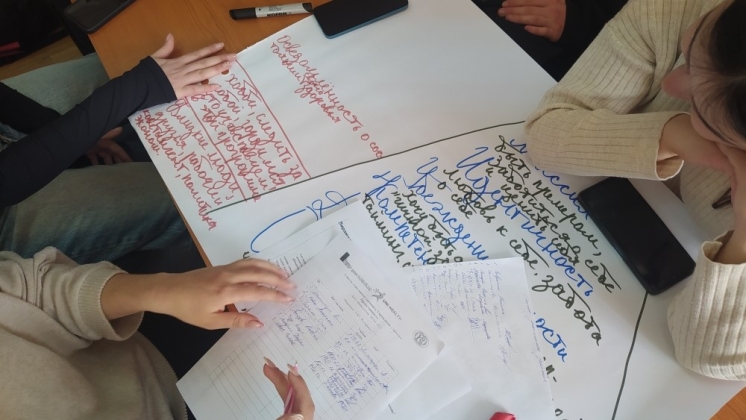
Within the framework of the UNI HEALTH project (Agreement n° KA 220-HED-47/05-10-2023), throughout the semester, training sessions were organized and implemented for students participating in the project, aimed at developing personal stress management skills. The sessions are conducted by pedagogical psychologists from the UNI HEALTH team – Liudmila Ibrișim, Assist. Lect. and Stela Cucеrеanu, Lect., PhD. The main idea of the psychological component is that a healthy lifestyle should be based on beliefs about the importance and benefits of various health-promoting activities. In psychological science, it is currently an undisputed fact that modern life exposes individuals to a large number of micro-stressors that negatively affect one’s life organization and, consequently, the efficiency of the human body (metabolic processes, cardiovascular system functioning, etc.). Therefore, the idea behind the stress management training involved a brief theoretical explanation of the nature of stress, discussion of typical stress situations encountered by young people, and a more detailed examination of individual stress response features.
On March 4, 2025, the first session took place, during which the concept of stress, stages of stress response, the nature of stress, characteristics of autonomic nervous system activity, and the specifics of the sympathetic and parasympathetic nervous systems were discussed. Participants explored the possibilities of stress developing into either eustress or distress. They learned what stress resistance is and under what conditions it can be developed. It was discovered that, fundamentally, all people have different levels of stress resistance. However, participants were encouraged by the fact that stress resistance skills can be developed over time. Specially organized training can contribute to:
- Expanding knowledge about the phenomenon of stress and methods of coping with it;
- Developing skills for self-regulation of psychophysiological states;
- Activating past experiences of successfully overcoming stressful situations;
- Forming models of constructive behavior in stressful conditions;
- Developing rational and positive thinking;
- Increasing awareness of one’s own behavior.
During the second session, which took place on March 11, the consequences of distress on human physiology, emotional state, behavior, and cognitive functions were discussed. The group analyzed the emergence of destructive eating behaviors as a stress response. Each session includes participants’ self-reflection and discussion of tools to address individual stress responses. At the session on March 26, 2025, the group discussed proactive strategies as a person’s ability to independently initiate actions and events, implement them creatively, and take responsibility for them. This skill helps to prioritize and avoid impulsive reactions. During the session, participants reflected on their personal responses to stress, identified their proactive and reactive behaviors, and analyzed the impact of reactivity on psychological and physical well-being. On April 9, 2025, a practical session was held using psychological tools for situation analysis. During group work, tools such as the “Circle of Concern/Influence” and “Dilts' Pyramid” were tested. These tools allow students to take a more active role in stress responses and to understand that there are situations where one can influence, control, and choose, and in such cases it is important to act consciously. At the same time, there are things beyond our control, and focusing on them only intensifies stress. The conclusion of this session was the idea of the importance of focusing on things that are crucial for achieving personal goals and lie within our sphere of influence. It should be noted that the trainers have developed theoretical materials for the sessions, as well as individual assignments that students can complete between meetings. The content of the training sessions sparks great interest and engagement among students. They ask questions, and during the sessions we search for answers through discussions and live dialogue. In future sessions, we plan to explore personal resources and systematize self-regulation tools for stressful situations.



